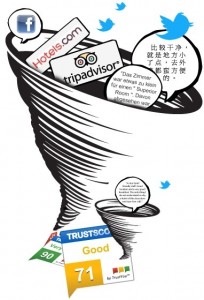 As a foreigner here in Canada, I do not know where are the best places to eat, to dance, to take a walk… So I use to relay in applications as Tripadvisor, Yelp, etc. On those applications you can see the reviews and comments from people from all around the world. But I already had more than one bad surprise…
As a foreigner here in Canada, I do not know where are the best places to eat, to dance, to take a walk… So I use to relay in applications as Tripadvisor, Yelp, etc. On those applications you can see the reviews and comments from people from all around the world. But I already had more than one bad surprise…
According to Nielsen, 70% of Internet users trust these online reviews and comments, actually, this trust index has grown considerably during the last four years but can we really trust them?
There is no way to know whether the comment that you are reading has been written by a real client or it was somebody hired by the hotel, restaurant or shop to write amazing things about it. So you never know but there are a few good practices or clues that can help you:
Look at the name of the author, if the name is something like BB3456 or Find cheap trips, those comments will not be very useful; probably they are written randomly and generated automatically.
Do not trust when you only see amazing reviews and comments. Use the common sense usually users come to the Internet to complain not to acclaim the service or product. You should at least find some negative comments (and those are the first you should read). According to Better Business Bureau, 80% of the products offered by the online retailer Amazon has four or more starts, how is this possible?
Run away from very technical comments. Sometimes you find comments that look like a catalogue description; those usually are just a copy and paste from the product description.
But, if I think that today I cannot really trust the reviews and comment, wait for 2014. Gartner predicts that in two to three years, 10 to 15 percent of all online reviews will be bought and paid for by businesses.
According to a statement by Gartner senior research analyst Jenny Sussin:
“With over half of the Internet’s population on social networks, organizations are scrambling for new ways to build bigger follower bases, generate more hits on videos, garner more positive reviews than their competitors and solicit ‘likes’ on their Facebook pages … Many marketers have turned to paying for positive reviews with cash, coupons and promotions including additional hits on YouTube videos in order to pique site visitors’ interests in the hope of increasing sales, customer loyalty and customer advocacy through social media ‘word of mouth’ campaigns.”
So, are you going to keep trusting reviews and comment?
Sources:
http://gigaom.com/2012/09/17/gartner-predicts-raft-of-fake-online-reviews-by-2014/
